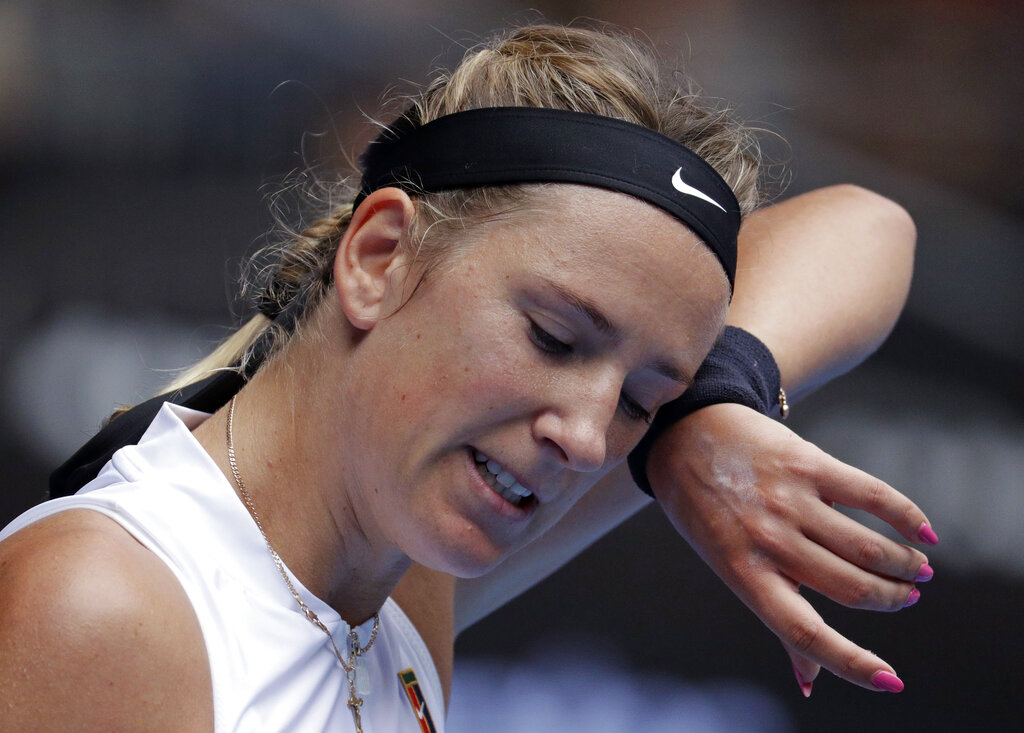Teary Victoria Azarenka admits to struggling after loss in Australia

Victoria Azarenka of Belarus wipes sweat from her face during her first round match against Germany’s Laura Siegemund at the Australian Open tennis championships in Melbourne, Australia, Tuesday, Jan. 15, 2019. (AP Photo/Aaron Favila)
MELBOURNE, Australia — Victoria Azarenka cried, pausing for a minute, trying to reflect on the differences between her past and present experiences of the Australian Open.
A back-to-back champion in 2012 and ’13, Azarenka sat in a small interview room at Melbourne Park answering questions for 10 minutes in the wake of her 6-7 (5), 6-4, 6-2 first-round loss to No. 110-ranked Laura Siegemund on Tuesday. Eventually, it drove her to tears.
Article continues after this advertisementEven when she was winning and ranked No. 1 there were struggles, she said. But it was a different kind of struggle — a word she used a dozen times.
A tournament official gave the 29-year-old Belarussian the option of stopping the news conference, and a member of her management team attempted to shut it down. But Azarenka, excusing herself first, and taking deep breaths, insisted on answering a question.
“I’ve been through a lot of things in my life,” she said, crying again. “Sometimes I wonder why I go through them. But I think they’re going to make me stronger.
Article continues after this advertisement“I want to believe that and I’m going to work hard for it. Sometimes I just need a little time and patience, and a little support.”
Her son, Leo, was born in December 2016 in a period in which Wimbledon in 2017 was the only Grand Slam tournament Azarenka entered in two years between the French Opens in 2016 and last year.
She had to skip some tournaments while working out a custody dispute with the father of her son. And she has spoken about the challenges of being a traveling, working mom.
She’s dealing with that, and with trying to find a way to convert the form she believes she has found in practice into matches. Her first-round loss at the last French Open was followed by a second-round exit at Wimbledon and a third-round appearance at the U.S. Open, moving her ranking back into the 50s. The trajectory didn’t keep going up.
“It was very obvious that my game was not there today,” she said. “I’ve been doing a lot of great things in warm-ups and stuff. In matches I think I’m underestimating for not really playing for almost three years on a high level — it’s not easy to continue just out of nowhere to start playing well.”
Then there was another question about comparing her level pre-2016 with where she’s at now.
“Every time you look back you always see the good things and the results. You don’t see the struggle, and the days that you had a bad match but you managed to win,” she said. “It’s hard to compare that with what’s happening right now because the obvious indicator is the result, and the result is not there. So the assumption is the level is not there, but that’s not necessarily the case.”
It feels like such a long time ago to her that she can barely remember what life was like at the top, although she concedes it wasn’t always great.
There were people who didn’t like the sound of her grunting, or her taste in music, and she was heavily criticized for an incident in her Australian Open semifinal win over Sloane Stephens in 2013.
Azarenka wasted five match points on serve before being broken in that game, then took a lengthy medical timeout right before Stephens had to serve to stay in the match. She was accused of taking a strategic break after admitting “I almost did the choke of the year!”
The controversy was still the main topic of headlines when she beat Li Na in the final.
“Not many people know how difficult 2013 was for me to go out there and play that final,” Azarenka said of her last major title here. “It was a nightmare that turned from harmless incident to just headlines, headlines and headlines. That was a difficult part. But results were good, so everybody thinks it was great.
“It was amazing to win those two titles. But you always struggle, and right now it’s just a harder struggle for me.”
Azarenka said she’d go away and work hard on her game, hoping that eventually she’ll relive some of the success of her early career.
“It’s not easy to sit here right now and be positive,” she said, “but I don’t have another choice.”